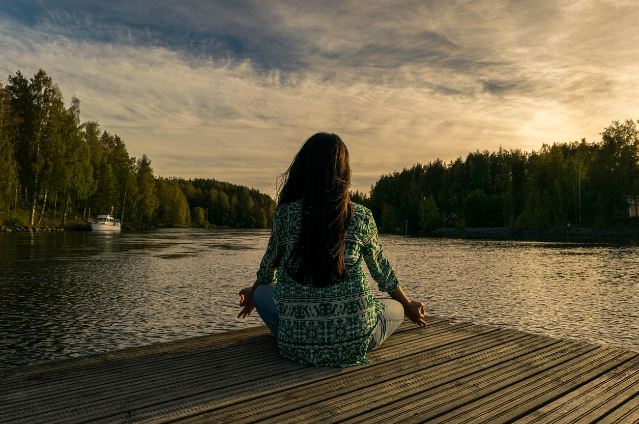
If someone told me I had a superpower, I'd laugh.
I’m not the kind of person who can disappear into thin air or read minds or shoot lightning bolts from my hands. I’m just… me. Ordinary.
Or at least that’s what I thought—until I found it.
It wasn’t glowing or dramatic. It wasn’t even visible. In fact, it’s something I’ve been doing every second of my life without noticing. And yet, when I learned to use it on purpose, it became the single most life-changing thing I’ve ever discovered.
That superpower? Breathing.
The Ordinary Power We Ignore
We all breathe. Constantly. Without asking our bodies to do it. We’re wired that way—breathing is an involuntary action.
We don’t look at someone and go, “Wow, you’re breathing so well today!” It’s so basic, so invisible, that it slips right past our radar.
And maybe that’s why I didn’t see its potential until much later in life.
The Problem I Didn’t See Coming
Here’s what you should know about me—I respond fast. Too fast.
If someone says something, I answer immediately.
If I’m happy, I overpromise. If I’m angry, I let my words fly like arrows. If I’m hurt, I show it without thinking.
At the time, I thought this made me “honest” and “straightforward.” But the truth? Many of those instant reactions ended with me wishing I had just… paused.
It’s not that emotions are bad. It’s that emotions, in their rawest form, that can cloud judgment. And I didn’t want my life to be steered by the heat of a single second.
The Day Yoga Changed Everything
When I started practicing yoga, I thought it would be about flexibility, balance, and maybe some peaceful music in the background. What I didn’t expect was the way it taught me to breathe.
Not just “stay alive” breathing.
Not the automatic inhale-exhale my body had been doing since birth.
But breathing, I actually controlled.
And that’s when it hit me: breathing could be voluntary, too.
My First Test
One day, someone made a mocking remark at me. Normally, this would’ve triggered an instant, sharp comeback. But instead, I paused.
I took a deep breath in.
Let it out slowly.
And in that small moment, I realized something important:
- They’re just talking.
- It’s just an opinion.
- It becomes my truth only if I accept it.
So I didn’t reply. I just… let it go.
It was such a strange mix of power and peace. I felt like I had stepped out of the usual game of “you insult me, I insult you.” And I didn’t miss playing.
The Shift in My Life
That tiny pause became a habit. Whenever I felt anger, joy, frustration, or even overexcitement bubbling up—I breathed.
Not the unconscious breathing we do to stay alive.
But a slow, deep, intentional breath.
And I began to notice something:
- My mind slowed down.
- My words became sharper in meaning, softer in tone.
- My decisions stopped coming from a place of impulse.
In short, I became calmer, and strangely, happier.
Involuntary vs. Voluntary Breathing
The way I see it now:
- Involuntary breathing keeps you alive. Your body does it without asking for permission.
- Voluntary breathing—even for just 2–3 seconds—helps you live better.
It’s like the difference between floating in water and actually swimming. One just keeps you from sinking; the other lets you move where you want to go.
Why This Works
When something happens—someone says something rude, or we get unexpectedly good news, or we feel a sudden rush of panic—our body reacts instantly. The heart rate spikes. The brain races.
In that state, we aren’t thinking; we’re just reacting. That’s why people regret things they say or do in the heat of the moment.
But a single deep breath interrupts the rush. It’s like pressing a “slow motion” button in your mind. It gives you just enough space to think:
- Do I really want to say this?
- Is this emotion worth expressing right now?
- What will happen if I react differently?
When I Use My Superpower
Here are moments when voluntary breathing has saved me:
- When I’m about to say something sarcastic to someone who doesn’t deserve it.
- When I’m about to agree to something I actually don’t want to do.
- When I’m about to lash out at a family member in the middle of an argument.
- When I’m about to blurt out my excitement to someone who might not receive it well.
- Each time, I take a breath. Each time, the outcome is better than it would’ve been otherwise.
What This Isn’t
This isn’t about never expressing yourself.
It’s not about bottling up emotions.
It’s about choosing when and how to express them.
And the breath is the bridge between emotion and expression.
Breathing as an Art
I’ve started to see breathing as an art—no less creative than painting or writing. Because in that pause, in that one intentional breath, you’re shaping what comes next.
You’re composing your next move, just like an artist chooses their next brushstroke.
And like any art form, it takes practice. At first, I had to consciously remind myself: Breathe before you speak. Now, it’s becoming natural—not as an involuntary act of survival, but as a voluntary act of wisdom.
The Truth About Superpowers
You know what? Maybe I do have a superpower.
It’s not flashy. It doesn’t come with a cape.
It’s invisible, quiet, and ridiculously simple.
But it’s saved me from countless arguments, bad decisions, and regret-filled apologies.
And the best part?
You have it too.
You just have to use it.
Now, I would really love to ask you to try breathing in my way.
